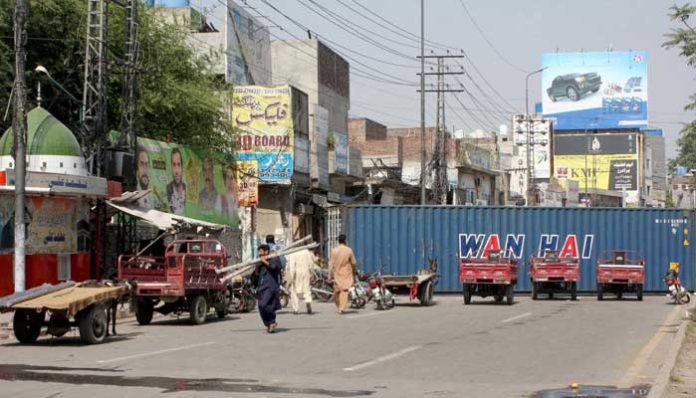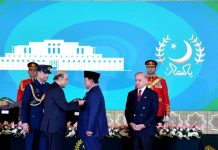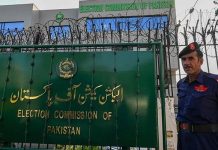The Punjab government has sent a summary to the Centre seeking a ban on Tehreek-e-Labbaik Pakistan (TLP) in the wake of a fresh protest call by the religious party, days after violent demonstrations in the province left many dead and scores injured.
The move is aimed at restoring public order and reinforcing the writ of the state and rule of law after last week’s clashes between TLP supporters and law enforcement agencies in Muridke and other cities.
The unrest began when police dismantled a TLP protest camp in Muridke, prompting confrontations that led to the death of a police station house officer (SHO), three others — including a passerby.
According to Punjab Information Minister Azma Bukhari, at least 1,648 police personnel were also injured, some of whom were struck by gunfire, while dozens of public and private vehicles were also torched, and commercial properties damaged.
In view of a new protest call for today, the police across the province have been put on high alert to deal with any untoward situation. Authorities assert that no individual or group would be permitted to take the law into their own hands.
Inspector General of Punjab Police Dr Usman Anwar reaffirmed that police were fully committed to upholding peace and the rule of law. “Strict and indiscriminate action will be taken against anyone who violates the law,” he said in a statement posted on X, adding that Section 144 — which bans gatherings of four or more people — would be implemented in full force across the province to protect lives and property.
According to media reports, the protest call was made by TLP’s Balochistan chapter president, who urged supporters to gather at Lahore’s Data Darbar after Friday prayers.
Intelligence assessments reportedly warned of possible attempts by party activists to incite violence and trigger widespread unrest following the protest call, prompting authorities to launch a province-wide crackdown. The response came amid growing concern following recent violent clashes linked to TLP protesters in Muridke.
Meanwhile, a separate group named Tanzeemat-i-Ahle Sunnat — not affiliated with the TLP — was also reported to have given a protest call, demanding a judicial inquiry into Monday’s pre-dawn operation in Muridke that triggered violent clashes and led to dozens of arrests. However, its leadership has since issued statements denying any strike or protest announcement.
Spokesperson Muhammad Akram Rizvi clarified that Tanzeemat-i-Ahle Sunnat had not called for a shutter-down or wheel-jam strike. “We are peaceful people and will not take the law into our own hands,” he said, urging the government to resolve matters through dialogue, which he described as “the only solution.”
Separately, Maulana Muhammad Ali Naqshbandi, speaking on behalf of Namus-e-Risalat Mahaz, also denied issuing any strike or protest call, echoing that no shutter-down had been announced by their group either.
In light of these developments, security operations were intensified throughout major cities. Police confirmed that a continued crackdown was underway in Lahore, where 624 individuals linked to the violent TLP protests have been detained so far.
Across Punjab, the total number of arrests has reached approximately 5,100, according to police figures. Raids were ongoing in various areas of Lahore as part of the operation to thwart the party’s mobilisation.
Security measures were particularly tight in the provincial capital. In the morning hours, several key routes leading to Data Darbar — including roads from Azadi Chowk, Bhati Gate, and Urdu Bazaar — were blocked off using containers and barbed wire.
A heavy police presence was deployed near Data Darbar and the District Katchery roundabout. Shops on both sides of Data Darbar Road were also closed, and pedestrian access to the shrine was only permitted from the Central Model School side. However, by early afternoon, all routes in the area had been reopened following Friday prayers, with containers and barricades removed and normal traffic and business activities resumed.
Lahore Capital City Police Officer (CCPO) Bilal Siddique Kamyana issued a firm warning, stating that law enforcement would deal with any disruptive elements with an iron hand. “No one will be allowed to misuse the protest cover for unlawful activities,” he said.
Kamyana warned that action would be taken against any attempts to shut down roads, shops, or transport services. “Ensuring the protection of life, property and businesses of citizens is our responsibility,” he said, adding that all markets and business centres would remain open as usual.
In Rawalpindi, security was visibly heightened at key locations including Murree Road, Liaquat Bagh, and Faizabad, with additional police contingents deployed. Officials confirmed that Section 144 was in effect across all districts of the Rawalpindi Division. Despite the high alert, roads connecting Rawalpindi and Islamabad remained open, and police reported that traffic on major thoroughfares was moving normally.
Preventive transport measures were also put in place in Lahore. The Punjab Transport Department said that metro bus operations had been partially suspended in Lahore and were now limited to the Gajjumata to MAO College route. Service from MAO College to Shahdara had been halted. Two stations on the Orange Line train — Bund Road and Multan Road — were also closed. Officials said these steps were taken due to security concerns surrounding the protest call.
In Multan, police declared a security high alert amid fears of similar demonstrations. Section 144 remains in effect across Punjab, barring all public gatherings.
In another statement, the Punjab police announced that security had been placed on high alert across the province on the orders of IGP Anwar, following credible intelligence suggesting possible disturbances.
According to the police, “foolproof security arrangements” had been further reinforced, particularly in Lahore, to prevent any untoward incidents. All field officers across Punjab had been instructed to remain vigilant and take immediate preventive action where necessary to ensure the safety of citizens and their property.
The directive also tasked district police officers, along with officials from the Special Branch and the Counter-Terrorism Department (CTD), with maintaining strict surveillance and monitoring of areas deemed sensitive. Law enforcement personnel were ordered to “keep a close eye on suspicious activities” and respond swiftly to any potential security threats or violations of the law.
Despite the heightened state of alert, police in a midday update said the overall situation remained calm and under control in cities across Punjab. Traffic was moving normally, and no major disruptions were reported in public areas, indicating that the preemptive measures may have helped prevent early escalation.
No justification for violent protests: Bukhari
Punjab Information Minister Azma Bukhari on Friday condemned the recent wave of protests led by a religious party, saying such violent demonstrations had no justification, especially when held under the pretext of expressing solidarity with Gaza.
She said Pakistan’s diplomatic role in supporting the Gaza ceasefire had been widely recognised, and questioned the motives behind the protest call issued after the truce was already in place. “Is setting police vehicles on fire going to solve the issue of Gaza?” she asked. “Those who resort to violent protests cannot be considered well-wishers of the country or its people.”
Bukhari said the state had decided it could no longer tolerate such forms of protest. “Blocking roads and shutting down cities under the guise of protest will not be allowed,” she warned, adding that fundamental rights must be protected, but no one had the right to take the law into their own hands.
The minister acknowledged the support of the business community, transporters and the general public for rejecting the strike call, saying their refusal demonstrated the awareness and resolve of the Pakistani people.
She confirmed that the Punjab cabinet had approved a ban on the TLP, and that a formal recommendation had been sent to the federal government for further action. However, she clarified that no decisions had been made regarding any mosques or madrasas, dismissing circulating rumours. “The people will not be misled,” she said.
“Dialogue is the only way forward — not violence,” she added.
The decision to seek a ban on TLP was made during a high-level meeting chaired by Chief Minister Maryam Nawaz on Thursday.
Although the group was not named in official statements, the provincial government vowed that individuals involved in spreading violence, inciting hatred, or causing public harm would be arrested and prosecuted under anti-terrorism laws.
Officials indicated that those responsible for attacks on police or destruction of property would be tried in anti-terrorism courts, and the names of senior party leaders and workers could be added to the Fourth Schedule under the Anti-Terrorism Act, which restricts the movement and activities of designated individuals.
Punjab government also disclosed plans to seize the group’s assets, block its social media presence, and remove all party banners, posters, and advertisements. Any violations of the Loudspeaker Act, officials added, would be met with strict penalties.
Meanwhile, Islamabad authorities also sealed TLP offices in Barakahu, Sowan, and other areas as part of the clampdown, later in the day. –Agencies




